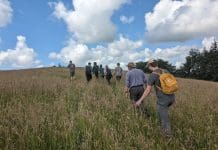From today (12 February), developers in England will have to deliver at least a 10% biodiversity net gain on new developments
Introduced by the Environment Act, biodiversity net gain (BNG) is an approach to development and land management that aims to leave the natural environment in a better state than it was beforehand.
The initial legislative BNG changes will apply to larger sites from 12 February 2024, with the policy to be enacted for smaller sites from April.
The delay in implementing the legislation on larger developments is to lessen the initial burdens and allow for a longer period for developers and local planning authorities to adapt to the new BNG legislation.
The implementation of the new BNG legislation on nationally significant infrastructure projects is planned for 2025.
Biodiversity net gain will prioritise on-site nature development to deliver the maximum benefits for people and nature.
How can developers comply with the new BNG legislation?
Developments that are subject to mandatory BNG requirements will be required to submit a biodiversity net gain plan for planning authority approval.
Developers can also comply with the new requirements by purchasing offsite biodiversity units, where third-party agencies or landowners will do nature work on the developer’s behalf somewhere else.
How is BNG measured?
Biodiversity Net Gain is measured using a biodiversity metric.
This metric calculates how many units a habitat contains before development, which is used to count how many units are needed to provide at least 10% BNG.
The biodiversity metric will provide ecologists, developers and planners with a means to assess changes in biodiversity value from developments or changes in land management.
Mandatory BNG will require the use of the biodiversity metric.
Helping to reverse the decline in nature
Commenting on the changes, environment minister, Rebecca Pow, said: “Biodiversity Net Gain will help us deliver the beautiful homes the country needs, support wildlife and create great places for people to live.
“This government is going further and faster for nature, since 2010 we have restored an area for nature larger than the size of Dorset, banned micro plastics and set ambitious targets to halt biodiversity decline.
“This vital tool builds on our work to reverse the decline in nature and for everyone to live within a 15-minute walk of a green space or water and will transform how development and nature can work together to benefit communities.”

















